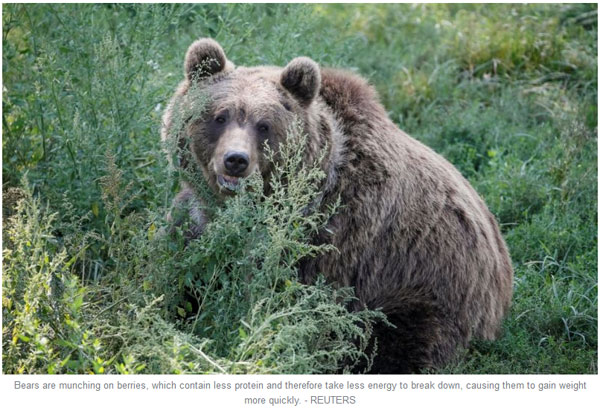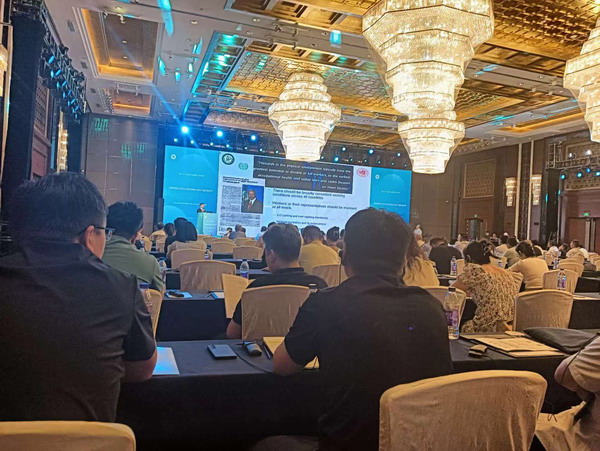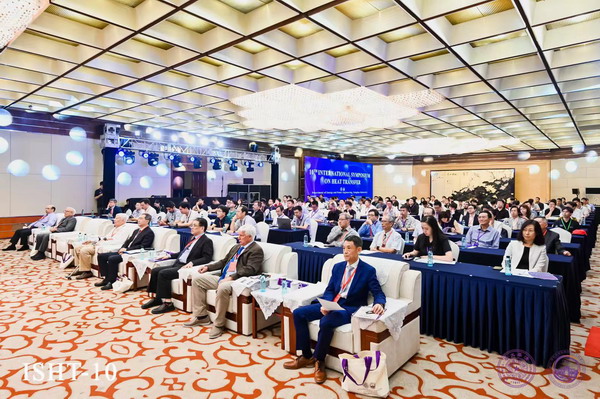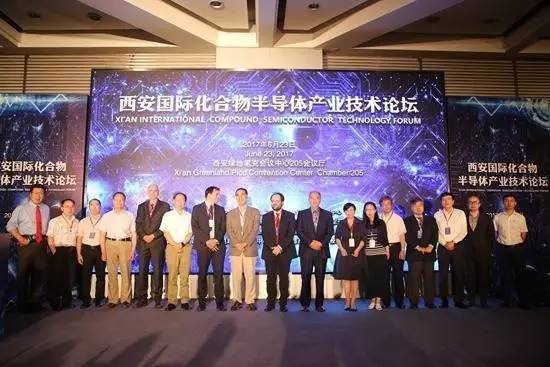Grizzly bears have stopped eating salmon in favour of elderberries after being forced to make a choice due to climate change. Warming temperatures meant that the berries are ripening earlier than usual, at exactly the same time as the freshwater streams on AlaskaĪ»s Kodiak Island are overflowing with sockeye salmon.
ė╔ė┌ÜŌ║“ūā╗»Ą─ė░ĒæŻ¼╗ęą▄▒╗Ų╚ū÷│÷ŲDļyŠ±ō±Ż¼Ę┼Śē§q¶~(y©▓)Ė─│įĮė╣Ū─Š╣¹ĪŻ£ž┼»Ą─ÜŌ║“╩╣Ą├Ø{╣¹│╔╩ņŲ┌╠ßŪ░Ż¼┼c┤╦═¼Ģr(sh©¬)Ż¼░ó└Ł╦╣╝ė┐ŲĄŽüå┐╦ŹuĄ─ĄŁ╦«║ė┴„└’ę▓öDØM┴╦╝t§qĪŻ
The island's brown bears typically feed first on salmon in early summer, followed by elderberries later in the season, in late August and September.
═∙─ĻŻ¼Źu╔ŽĄ─ūžą▄į┌Ž─│§Ž╚│į┴╦§q¶~(y©▓)Ż¼╚╗║¾į┌░╦į┬─®║═Š┼į┬│įĮė╣Ū─Š╣¹ĪŻ
"What you have is a scrambling of the schedule," said William Deacy, a biologist at Oregon State University that studied the phenomenon.
蹊┐▀@éĆ(g©©)¼F(xi©żn)Ž¾Ą─ČĒ└šī∙ų▌┴ó┤¾īW(xu©”)Ą─╔·╬’īW(xu©”)╝ę═■┴«?ĄŽ╬„ĘQŻ║Ī░╚ńĮ±Ą─╔·╬’│╔╩ņŲ┌╩«Ęų╗ņüyĪŻĪ▒
"It's essentially like if breakfast and lunch were served at same time and then there is nothing to eat until dinner.
Ī░▀@Š═║├▒╚įń▓═║═╬ń▓══¼Ģr(sh©¬)╦═╔ŽüĒ(l©ói)Ż¼─Ū├┤═Ē▓═Ū░Š═╩▓├┤Č╝ø](m©”i)Ą├│į┴╦ĪŻĪ▒
"You have to choose between breakfast and lunch because you can only eat so much at a time."
Ī░─Ń▒žĒÜį┌įń▓═║═╬ń▓═ķgū÷Š±ō±Ż¼ę“?y©żn)ķ─Ńę╗┤╬ų╗─▄│į─Ū├┤ČÓĪŻĪ?/div>
The study found that during the unusually warm summer of 2014, the bears, which would traditionally kill up to 75 percent of the salmon, were nowhere to be seen near the streams.
蹊┐░l(f©Ī)¼F(xi©żn)Ż¼į┌2014─ĻŻ¼Ž─╝Š«É│Ż£ž┼»Ż¼Ą½┴„╦«┼įģs▓╗ęŖ(ji©żn)╗ęą▄Ą─█Öė░ĪŻšš═∙│ŻüĒ(l©ói)šf(shu©Ł)Ż¼╦³éā▀@Ģr(sh©¬)║“┐╔ę¬│įĄ¶Ė▀▀_(d©ó)75%Ą─§q¶~(y©▓)ĪŻ
Instead, they were in the hills busy munching on berries, which contain less protein and therefore take less energy to break down, causing them to gain weight more quickly.
Ą½╩ŪŻ¼╦³éāę╗Ę┤│ŻæB(t©żi)Ż¼┼▄ĄĮ╔Į╔Ž┤¾│įØ{╣¹ĪŻØ{╣¹└’├µĄ─Ą░░ū┘|(zh©¼)║¼┴┐Ą═Ż¼Ž¹╗»ĘųĮŌ╦∙ąĶ─▄┴┐╔┘Ż¼ę“┤╦╦³éāķL(zh©Żng)┼ųĄ─╦┘Č╚ę▓╝ė┐ņ┴╦ĪŻ
Biologists warned that changes caused by a warming planet were behind the bears' unusual behavior and could affect the entire ecosystem.
╔·╬’īW(xu©”)╝ęéāŠ»ĖµĘQŻ¼╗ęą▄▓╗īż│ŻĄ─ąą×ķ▒│║¾Ę┤ė│Ą─╩Ū╚½Ū“ūā┼»╦∙ĦüĒ(l©ói)Ą─ūā╗»Ż¼┐╔─▄Ģ■(hu©¼)ė░Ēæš¹éĆ(g©©)╔·æB(t©żi)ŽĄĮy(t©»ng)ĪŻ

The researchers found that the forests around the streams suffered because the bearsĪ» fishcarcasses were no longer there to enrich the soil.
蹊┐╚╦åT░l(f©Ī)¼F(xi©żn)Ż¼ø](m©”i)ėą╗ęą▄│į╩ŻĄ─¶~(y©▓)║ĪüĒ(l©ói)Įo═┴╚└į÷Ę╩Ż¼║ė┴„ų▄ć·Ą─╔Ł┴ųęčĮø(j©®ng)╩▄ĄĮ┴╦ė░ĒæĪŻ
"Bears switched from eating salmon to elderberries, disrupting an ecological link that typicallyfertilizes terrestrial ecosystems and generates high mortality rates for salmon," the studysaid.
蹊┐▒Ē├„Ż║Ī░╗ęą▄▓╗│į§q¶~(y©▓)Ė─│įĮė╣Ū─Š╣¹Ą─ąą×ķ▓╗āHŲŲē─┴╦ū╠B(y©Żng)ĻæĄž╔·æB(t©żi)ŽĄĮy(t©»ng)Ą─╔·æB(t©żi)µ£Ż¼▀Ć┤┘│╔┴╦§q¶~(y©▓)Ą─Ė▀╦└═÷┬╩ĪŻĪ▒
On average, red elderberries are said to be ripening two and a half days earlier every decade.
ō■(j©┤)ĘQŻ¼ŲĮŠ∙├┐╩«─ĻŻ¼╝tĮė╣Ū─Š╣¹│╔╩ņĄ─Ģr(sh©¬)ķgĢ■(hu©¼)╠ßŪ░ā╔╠ņ░ļĪŻ
If the pattern continues, they will regularly overlap with the salmon by 2070.
╚ń╣¹į┘▀@śėŽ┬╚źŻ¼ĄĮ2070─ĻŻ¼§q¶~(y©▓)║═Įė╣Ū─Š╣¹Ą─│╔╩ņŲ┌īóĢ■(hu©¼)Č©Ų┌ųž║ŽĪŻ
The study was published in the Proceedings of the National Academy of Sciences.
▀@ĒŚ(xi©żng)蹊┐│╔╣¹ęčį┌ĪČ├└ć°(gu©«)┐ŲīW(xu©”)į║īW(xu©”)ł¾(b©żo)ĪĘ╔Ž░l(f©Ī)▒ĒĪŻ




